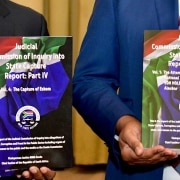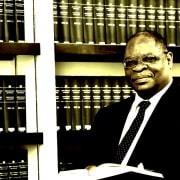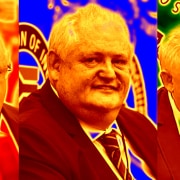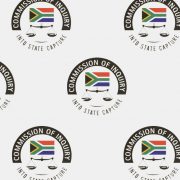|
Getting your Trinity Audio player ready...
|
By David Lewis
First published in the Sunday Times
Reading Jacques Paauw’s The President’s Keepers, I discerned two wings of the Zuma family’s commercial empire. The first could be described as their ‘business’ interests with the Guptas as their primary, if not exclusive, partners. Jacob Zuma’s son Duduzane exercised oversight of these family interests.
The other wing comprised the (even more) dodgy relationships with cigarette smugglers and other assorted criminals. Oversight of these interests was seemingly entrusted to Edward Zuma, Duduzane’s more rough-hewn half-brother.
Duduzane was no mere idle playboy. He had a complex set of relationships to oversee, major public sector tenders to secure for the Guptas and vast amounts of money to hide. His father could not do this alone. Jacob Zuma didn’t have a great track record in managing the family’s money, and he also had a political party to keep in check and a government to run. Given the family’s commercial interests, Zuma Senior’s key governmental task was ensuring that the wrong people were placed in the right jobs. But eventually he outsourced even these decisions to his trusted Duduzane and the Gupta brothers.
Duduzane has been arrested and apparently will be charged for his role in allegedly offering Mcebisi Jonas, then deputy finance minister, a huge bribe to persuade him to assume the position of finance minister.
Several government posts were critical to advancing the capture of the state by the Zuma/Gupta conspiracy. The loyalty of the security cluster of ministers – and with it control over the criminal justice institutions – was critical. Appointments to boards and key executive positions in the big-spending state owned enterprises were as important. Ministries such as mineral resources and public enterprises had to be run by tame lap dogs.
Zuma had the key decision-making centres of the state tied up through his presidential prerogative to appoint ministers and his statutorily protected right to make other key appointments. Except for the Treasury.
One may or may not agree with their macroeconomic policies, but as the Zuma years starkly revealed, our post-1994 finance ministers have been a conspicuously honest and competent bunch. It’s interesting to reflect on reasons for this.
The response to Nhlanhla Nene’s sacking and his replacement by Des van Rooyen convinced me that the appointment of the finance minister is, like no other government post, subject to external pressure and sanction: replace a competent and honest soul like Nene with a failed small-town mayor like Van Rooyen and those who make investment decisions will have their say.
For the architects of state capture, though, dealing with an honest finance minister was extremely inconvenient, even downright dangerous. Not only did the Treasury make and enforce the rules regarding public procurement, it oversaw critical regulatory and enforcement institutions like the South African Revenue Services (SARS), the Reserve Bank and the Financial Intelligence Centre (FIC). In the case of SARS – a huge problem for both wings of the Zuma commercial empire – even after Zuma had appointed one of his most craven loyalists as the institution’s head, an honest finance minister supported by an honest FIC remained a major obstacle to total state domination.
And so Nene had to be replaced.
The Zuma/Gupta conspiracy clearly recognised that it needed someone credible in this post – hence the attempt to bribe the generally well-regarded Jonas to take the finance ministry, turning to Van Rooyen only when that failed. This proved disastrous not only because Zuma was forced into a humiliating public back-down, but because he had to turn to Pravin Gordhan to fill the post.
Among Gordhan’s signal accomplishments was his previous leadership of SARS, one of the world’s most highly regarded revenue collecting agencies. It was inevitable that as finance minister he would take a particular interest in the decline of that critical institution.
The Zuma/Gupta assault on Gordhan started immediately, deploying the securely captured criminal justice and intelligence agencies as their principal attack dogs.
Here are two lessons from Duduzane Zuma’s court appearance.
First, we learn, and we hope that those who are contemplating a life of corruption also learn, that even the mighty can fall.
Those who enjoyed Zuma’s protection imagined it would last until, in the words of their don, Jesus came. But there are honest public servants occupying critical posts; there is a robust civil society and media; there is an independent judiciary; there was political contestation even, however muted, within the generally compliant decision-making structures of the governing party. And there are elections – ANC elections, and national elections which some party members were starting to fear they could lose.
Above all there were people who, once the wheels of the Gupta/Zuma enterprise started coming off, they headed for the exits. I am fascinated by media references hinting that the prosecution’s case against Duduzane has been strengthened following a conversation with Fana Hlongwane, the controversial arms deal-connected business person, who was present when Atul Gupta is alleged to have offered Jonas the bribe.
So was Duduzane Zuma, and if he is vulnerable to prosecution on the basis that he set up the meeting and was in the room at the critical moment, so too is Hlongwane. We’ll undoubtedly hear more about this. Many others may want to contemplate who was in the room when they cut their own corrupt deals.
Secondly, we learn the power of integrity. I have no doubt Jonas was offered a bribe. I recall vividly a call-in guest on a radio show who said that when he heard that Jonas was offered R600 000, he thought he was an honest man for turning it down. But when he learnt that the offering was R600-million, he concluded that Jonas was a liar.
But this story negates the cynical adage that ‘everyone has their price’. This proves that there are those who don’t and they are to be found in the lowest ranks of the police and in the highest ranks of the cabinet and the boardroom. They are the real heroes in the fight against corruption.







